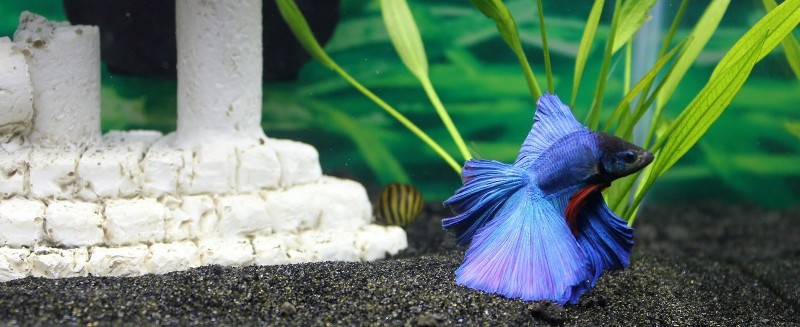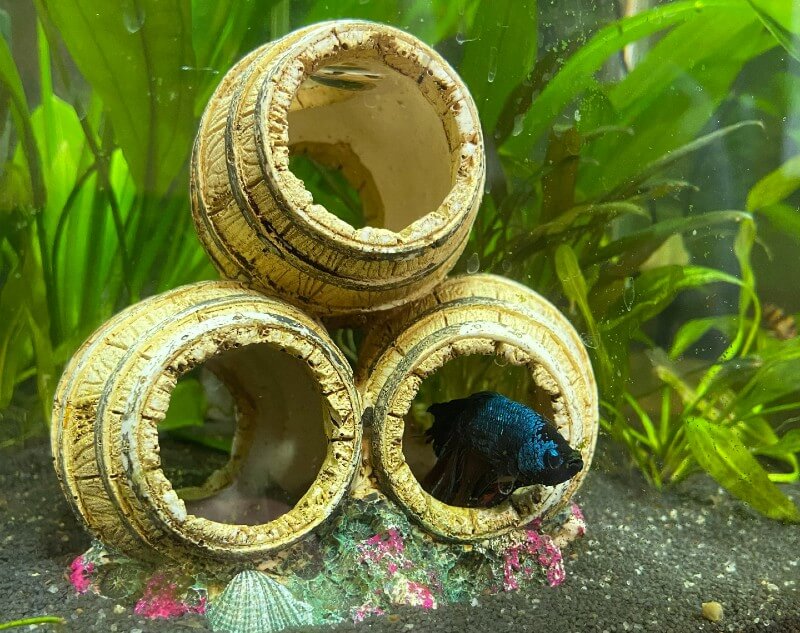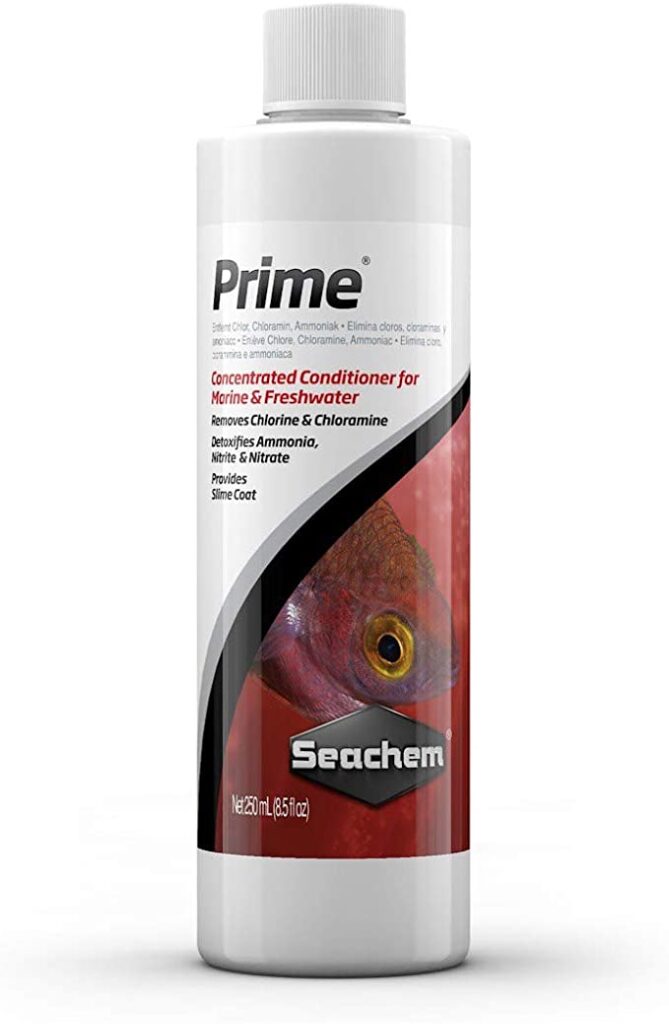When checking the water parameters of your Betta fish’s tank, you also need to keep a close eye on the temperature. Betta fish temperature shock is a common issue, where the Betta reacts badly to water that is either too cold or too warm.
It’s a serious issue and can injure or kill your Betta fish if left untreated. So you need to know what the signs of Betta temperature shock are, and what to do if your Betta seems to be suffering.
Don’t worry though, I’ve got you covered. Read on to learn about all the symptoms of temperature shock in Betta fish and the steps you can take to help them recover.

Betta Fish temperature shock symptoms
Betta temperature shock symptoms vary depending on whether the water is too cold, or too hot. If they’re too cold, expect them to get lethargic and potentially fall into a coma, or to show signs of sickness more frequently. Too hot, and they will swim erratically and struggle to breathe.
It’s usually more common for a Betta fish to go into cold water shock, unless you’re adding very hot water into their tank. Inexperienced owners might rely on their heater to warm up the cooler water they add, which is why cold water temperature shock tends to happen more frequently.
So how do you know if your Betta fish is in shock? You need to look out for the tell-tale signs.
Read more: Betta behavior before death
With cold water shock, your Betta will start looking more lethargic, like they’ve lost their energy. The shock to their system makes swimming more difficult, so they’ll stay as still as they can. They may rest at the bottom of the tank, just because they don’t have the energy to do anything else. And they could lose some of their color.
In serious cases they could even slip into a coma, where their brain functions slow down so much due to a lack of oxygen that they can’t move at all. If your fish looks dead, try raising the water temperature quickly, as it may revive them.
Read more: How Long Do Betta Fish Live?
With hot water shock, the symptoms are almost the complete opposite. It’s not as severe but it’s still something you’ll want to correct quickly. Your Betta fish will breathe more rapidly, and probably stay at the surface as they try to get as much oxygen as they can onboard.
They’ll also start swimming quickly and erratically. It might look like zoomies, but it’s not fun – it’s a sign of stress, and it could weaken their immune system too.

Betta temperature shock treatment
The only real treatment for temperature shock in Betta fish is to adjust the temperature to a safe level for them. Make sure you’re monitoring their tank temperature, and adjust it by 2-3 degrees every couple of hours. Any faster and you’re likely to cause more harm.
It’s no good dumping a load of hot water into the tank to counter cold water shock, since the temperature won’t normalize immediately and your Betta will just go through even more stress, struggling with the water that’s too cold and too hot in different areas.
Unless it’s an emergency, and your Betta is in a coma, just take your time with the temperature changes. It may take time to see signs of recovery but this is the safer way to do things.
I use a mixture of cold and hot water (boiled) to get the water I’m adding to as close to the correct temperature for my Betta’s tank as possible.
The reason I boil the water is that the hot water from your faucet can contain chemicals found in the heating system that are harmful to fish. I also treat the water with a dechlorinator ( I use Seachem Prime, which you can pick up here)
Read more: How long does water conditioner take to make tap water safe?
It’s also important that you bear in mind the temperature of the room where the aquarium is kept. If the room is particularly cold or hot, then the heater may struggle to regulate the water temperature correctly. Consider whether you need to make adjustments to the ambient temperature, or move the tank altogether.
Can Betta recover from temperature shock?
Betta fish can recover from temperature shock providing you act quickly to adjust the water temperature levels. However that doesn’t mean rushing to counter the temperature – small adjustments are better, unless you think your Betta needs emergency treatment, such as if they appear comatose.
It may seem at first that your Betta isn’t recovering even once you’ve got the temperature to an optimum level. But they will need some time to come around from the shock. Don’t panic and raise or lower the temperature any further, but give them a few hours and keep monitoring them closely.
The symptoms may take even longer to fully disappear – sometimes a few days or even a week or more. During this time you just need to make sure that you do everything you can to best look after your Betta. Give them a high-quality diet, and test the water parameters more frequently, making adjustments when needed.
If your Betta loses their color due to temperature shock, this can be one symptom that has a longer recovery time. It may be a month before your Betta’s color fully returns. Don’t panic if it takes this long, as long as you continue to monitor their water then they will get back to full health soon.

What is too hot for a betta fish?
Betta fish are best suited to temperatures between 75 and 80 degrees Fahrenheit, but can usually tolerate temperatures as low as 72 and as high as 86. Any higher than this and it will be too hot for your Betta fish, and they’ll start behaving erratically.
Colder water is a more serious concern for Betta fish than water that is too hot. When it’s too hot (providing it’s not excessive), it will give your Betta more energy, which will result in them needing more oxygen. It’s still something to worry about, because that will put stress on your fish’s immune system (and also cause them to feel stressed), so you do still need to address it.
But cold water is more serious as it slows down your Betta’s functions. Water that’s below 72 degrees is more likely to kill a Betta than water above 86 degrees.

Betta Fish in shock after water change? Here’s what to do
If your Betta fish is in temperature shock, you need to gradually adjust the temperature of the water every couple of hours by 2-3 degrees until it’s within the optimum range. Aim for between 75 and 80 degrees. Don’t rush any changes, as that will likely harm your fish.
So firstly, you should be checking the temperature of the water you’re adding during a water change. It doesn’t need to be an exact match for the tank, but aim for within one degree if you can. If the water is too warm, leave it to settle and normalize. If it’s too cold, try heating it gently.
But if the damage has already been done, you can make adjustments by carrying out partial water changes every few hours until the tank temperature is within the best range. You should only change water faster than this if the symptoms are severe – such as if your Betta has slipped into a coma.
Then, check your heater to make sure it is working correctly, and that it is set at the appropriate temperature for a Betta fish – between 75 and 80 degrees Fahrenheit. If it’s faulty then replace it immediately.
If you suffer a power outage and the heater stops working, you can wrap the tank in towels, blankets or other insulating material until you can restore the power. This will help to keep the tank’s temperature as stable as possible in the short term. It’s good to keep a battery-powered air pump for these situations too, and add that as soon as the mains-powered one is off.
How To Regulate Betta Tank Temperature
There are some great aquarium heaters available from pet stores and online, but there is a product that many fish owners are turning to that is something of a game-changer.
Inkbird ITC-306A WiFi Temperature Controller

- Protects fish from overheated water
- Dual display window; displays measured and set temperature at same time
- High and low temperature alarms
- Heating time can be set from 1-72 hours if needed
It’s difficult to avoid temperature swings that can be harmful to Bettas, especially when your room experiences high temperatures in summer or the temperature drops in winter.
Unlike regular tank heaters, the Inkbird allows you to keep on top of your water temperature with a number of unique features.
You can pair the aquarium temperature controller with your phone via 2.4GHz Wi-Fi the INKBIRD app will alert you with push notifications if it senses a problem.
The aquarium temperature controller is equipped with 2 relays to ensure that the power can be turned off under any circumstances, this will protect your fish from being hurt by overheated water (US Socket Only).
The controller uses two probes, in case one stops working. The dual probe aquarium temperature controller will alarm if the temperature difference between 2 probes is bigger than 3°C/5°F, and the INKBIRD app will send a push notification to your phone to alert you.
The heating time can be set according to your needs from 1 hour to 72 hours, and the controller will alarm if water can not be heated to the setting temperature within the specified time.
The 1100w high-power aquarium temperature controller is compatible with most kinds of heaters, so you don’t need to assemble the product yourself, just plug and play.
If you want complete peace of mind, this product takes total care of your Betta’s water temperature.
Summary
Whenever you change the water in your tank, always get as close a match as possible for the temperature of the new water. Don’t rely on the heater to do the job of normalizing it for you. And closely monitor the temperature of the tank.
If you start to see signs of temperature shock, despite your best efforts, make sure you use a separate thermometer in case your heater’s readout is faulty too. And don’t rush to make changes unless it’s an emergency – even then, you need to be measured in your reaction.
Hopefully by following these tips you’ll never have problems with temperature shock, but at least if you do then you know how to act to resolve it quickly and keep your Betta fish healthy.
Related Posts


